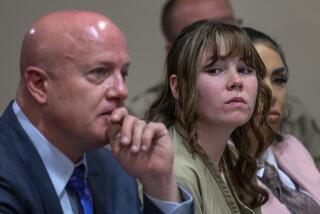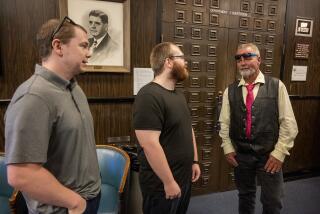Release of widow ends bizarre case
- Share via
SAN DIEGO — After 876 days in jail for a murder that prosecutors now say did not happen, Cynthia Sommer knew what she wanted: a fancy coffee drink at Starbucks, followed by a coconut-shrimp dinner at Bully’s restaurant.
In the next few days, Sommer, 34, said at a Friday news conference, she plans to go shopping and spend time with her children. Her 16-year-old daughter was to reunite with her Friday night. She plans to travel to Michigan to see her three sons -- ages 8, 12 and 13.
Later, she said, she will decide how to pay her legal bills and whether to sue the district attorney for prosecuting her and overlooking evidence that ultimately cleared her of poisoning her Marine husband.
On Thursday, San Diego County Dist. Atty. Bonnie Dumanis moved to dismiss murder charges against Sommer, telling reporters that overlooked evidence and new scientific scrutiny had poked holes in the prosecution’s assertion that she used arsenic to kill Sgt. Todd Sommer.
It was a startling conclusion to a murder prosecution built on a tabloid-style scenario of a scheming wife poisoning her younger husband, watching as he died and then -- soon after -- getting a $5,400 breast augmentation, partying and having sex with several partners.
Within hours of Dumanis’ announcement, Sommer was free. “I never lost any hope, faith or anything,” she said Friday. “You can never give up if you’re innocent.”
In announcing the dismissal of the charges Thursday, Dumanis said, “Justice has been done.”
Sommer and her attorney, Allen Bloom, disagreed. “I don’t think Bonnie Dumanis would agree if she was in jail wrongfully accused of murdering her husband,” Sommer said.
In November a jury convicted Sommer of first-degree murder, but the trial judge overturned the verdict, ruling that prosecutors’ description of her “lifestyle” was so inflammatory that it deprived Sommer of a fair trial.
She had been convicted of murder with special circumstances -- murder for hire and murder by poison -- that carried a mandatory life sentence without possibility of parole. Todd Sommer, 23, was stationed at Miramar Marine Corps Air Station and appeared to be in excellent health when he fell ill and died within days in 2002. Married in 1999, the couple had a son. Cynthia Sommer had three children by a previous marriage.
When she was arrested in 2005, she had moved to Florida.
Prosecutors had said Sommer killed her husband to collect on his $250,000 life insurance policy and begin a new, fun-filled life. She had remained in jail while prosecutors prepared for a second trial.
In response to a discovery motion by Bloom, Sommer’s new defense attorney, prosecutors gathered all the tissue samples that had been taken from her husband’s body, including some that were not tested before the first trial.
When they had the new samples tested, experts could not find arsenic -- creating what Dumanis called reasonable doubt that Todd Sommer had died of arsenic poisoning. An expert newly hired by the prosecution also suggested that earlier samples in which arsenic was found had been contaminated.
Bloom said it should not have taken a defense motion to make prosecutors gather samples that had remained at the San Diego Naval Medical Center since Todd Sommer’s death.
“It’s scary how [prosecutors] are dealing with this now,” Bloom said. “They’re taking credit for doing the right thing. They didn’t do the right thing! Justice was done, but not because of the prosecution in this case but despite the prosecution.”
During the trial, San Diego County Superior Court Judge Peter Deddeh told prosecutors he would not allow evidence about Sommer’s behavior after her husband’s death .
But Deddeh relented when defense attorney Robert Udell opened the door by introducing his own evidence of Sommer as a grieving widow.
After the conviction, Deddeh ruled that her attorney’s error had deprived Sommer of a fair trial.
The evidence about her breasts, drinking and sexual activity “became like an overwhelming cloud that covered everything,” said Bloom, one of San Diego’s most prominent defense attorneys.
Even as both sides prepared for a second trial, prosecution investigators were again asking Sommer’s friends questions about her behavior after her husband’s death, Bloom said.
The lawyer said he was prepared to call experts who would suggest that Todd Sommer died of a heart ailment or reaction to weight-control pills or an anti-diarrhea prescription medication.
Asked if she was angry at prosecutors, Sommer said, “Wouldn’t you be?”
--
More to Read
Sign up for Essential California
The most important California stories and recommendations in your inbox every morning.
You may occasionally receive promotional content from the Los Angeles Times.













